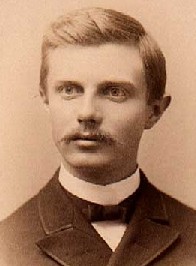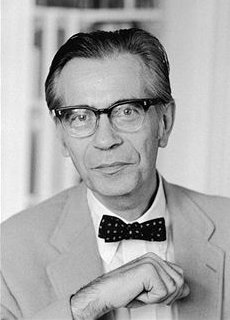Related Research Articles

Frederick Jackson Turner was an American historian during the early 20th century, based at the University of Wisconsin-Madison until 1910, and then Harvard University. He was known primarily for his frontier thesis. He trained many PhDs who went on to become well-known historians. He promoted interdisciplinary and quantitative methods, often with an emphasis on the Midwestern United States.

Charles Austin Beard was an American historian and professor, who wrote primarily during the first half of the 20th century. A history professor at Columbia University, Beard's influence is primarily due to his publications in the fields of history and political science. His works included a radical re-evaluation of the Founding Fathers of the United States, whom he believed to be more motivated by economics than by philosophical principles. Beard's most influential book, An Economic Interpretation of the Constitution of the United States (1913), has been the subject of great controversy ever since its publication. While it has been frequently criticized for its methodology and conclusions, it was responsible for a wide-ranging reinterpretation of early American history.

Jacksonian democracy was a 19th-century political philosophy in the United States that expanded suffrage to most white men over the age of 21 and restructured a number of federal institutions. Originating with the seventh U.S. president, Andrew Jackson and his supporters, it became the nation's dominant political worldview for a generation. The term itself was in active use by the 1830s.

Richard Hofstadter was an American historian and public intellectual of the mid-20th century. Hofstadter was the DeWitt Clinton Professor of American History at Columbia University. Rejecting his earlier historical materialist approach to history, in the 1950s he came closer to the concept of "consensus history", and was epitomized by some of his admirers as the "iconic historian of postwar liberal consensus." Others see in his work an early critique of the one-dimensional society, as Hofstadter was equally critical of socialist and capitalist models of society, and bemoaned the "consensus" within the society as "bounded by the horizons of property and entrepreneurship", criticizing the "hegemonic liberal capitalist culture running throughout the course of American history".

The Progressive Era (1896–1917) was a period in the United States during the early 20th century of widespread social activism and political reform across the country that focused on defeating corruption, monopoly, waste, and inefficiency. The main themes ended during American involvement in World War I (1917–1918) while the waste and inefficiency elements continued into the 1920s. Progressives sought to address the problems caused by rapid industrialization, urbanization, immigration, and political corruption; and by the enormous concentration of industrial ownership in monopolies. They were alarmed by the spread of slums, poverty, and the exploitation of labor. Multiple overlapping progressive movements fought perceived social, political and economic ills by advancing democracy, scientific methods, professionalism and efficiency; regulating businesses, protecting the natural environment, and improving working conditions in factories and living conditions of the urban poor. Spreading the message of reform through mass-circulation newspapers and magazines by "probing the dark corners of American life" were investigative journalists known as "muckrakers". The main advocates of progressivism were often middle-class social reformers.

Vernon Louis Parrington was an American literary historian, scholar, and college football coach. His three-volume history of American letters, Main Currents in American Thought, won the Pulitzer Prize for History in 1928 and was one of the most influential books for American historians of its time. Parrington taught at the College of Emporia, the University of Oklahoma, and the University of Washington. He was also the head football coach at the College of Emporia from 1893 to 1896 and Oklahoma from 1897 to 1900. Parrington founded the American studies movement in 1927.

Arthur Meier Schlesinger was an American historian who taught at Harvard University, pioneering social history and urban history. He was a Progressive Era intellectual who stressed material causes and downplayed ideology and values as motivations for historical actors. He was highly influential as a director of PhD dissertations at Harvard for three decades, especially in the fields of social, women's, and immigration history. His son, Arthur M. Schlesinger Jr. (1917–2007), also taught at Harvard and was a noted historian.

Mary Ritter Beard was an American historian, author, women's suffrage activist, and women's history archivist who was also a lifelong advocate of social justice. As a Progressive Era reformer, Beard was active in both the labor and women's rights movements. She also authored several books on women's role in history including On Understanding Women (1931), America Through Women's Eyes, and Woman as Force in History: A Study in Traditions and Realities (1946), her major work. In addition, she collaborated with her husband, historian Charles Austin Beard, as coauthor of seven textbooks, most notably The Rise of American Civilization (1927), two volumes, and America in Midpassage: A Study of the Idea of Civilization (1939) and The American Spirit (1942), the third and fourth volume of The Rise of American Civilization series. A standalone book, Basic History of the United States, was their best-selling work.
William Appleman Williams was one of the 20th century's most prominent revisionist historians of American diplomacy. He achieved the height of his influence while on the faculty of the department of history at the University of Wisconsin–Madison and is considered to be the foremost member of the "Wisconsin School" of diplomatic history.

Edwin Robert Anderson Seligman (1861–1939), was an American economist who spent his entire academic career at Columbia University in New York City. Seligman is best remembered for his pioneering work involving taxation and public finance. His principles for a progressive federal income tax were adopted by Congress after the passage of the Sixteenth Amendment. A prolific scholar and teacher, his students had great influence on the fiscal architecture of postcolonial nations. He served as an influential founding member of the American Economics Association.

The values and ideals of republicanism are foundational in the constitution and history of the United States. As the United States constitution prohibits granting titles of nobility, republicanism in this context does not refer to a political movement to abolish such a social class, as it does in countries such as the UK, Australia, and the Netherlands. Instead, it refers to the core values that citizenry in a republic have, or ought to have.
Ulrich Bonnell Phillips was an American historian who largely defined the field of the social and economic studies of the history of the Antebellum South and slavery in the U.S. Phillips concentrated on the large plantations that dominated the Southern economy, and he did not investigate the numerous small farmers who held few slaves. He concluded that plantation slavery produced great wealth, but was a dead end, economically, that left the South bypassed by the industrial revolution underway in the North.

An Economic Interpretation of the Constitution of the United States is a 1913 book by American historian Charles A. Beard. It interpreted the early history of the United States from the lens of class conflict, arguing that the Constitution of the United States was structured to financially benefit the Founding Fathers.
Forrest McDonald, Jr. was an American historian who wrote extensively on the early national period of the United States, republicanism, and the presidency, but he is possibly best known for his polemic on the American South. He was a professor at the University of Alabama, where, together with Grady McWhiney, he developed the hypothesis that the South had been colonized by "Anglo-Celts," rather than the British Protestant farmers who populated the North.
In United States politics, modern liberalism, a form of social liberalism, is one of two current major political ideologies. It combines ideas of civil liberty and equality with support for social justice. Economically, modern liberalism supports government regulation on private industry, opposes corporate monopolies, and supports labor rights. Its fiscal policy opposes any reduction in spending on the social safety net, while simultaneously promoting income-proportional tax reform policies to reduce deficits. It calls for active government involvement in other social and economic matters such as: reducing economic inequality, increasing diversity, expanding access to education and healthcare, regulating economic activity, and environmentalism. Modern liberalism was formed in the 20th century in response to the Great Depression. Major examples of modern liberal policy programs include the New Deal, the Fair Deal, the New Frontier, the Great Society, the Affordable Care Act, and the Infrastructure Investment and Jobs Act.

Merrill Monroe Jensen was an American historian, whose research and writing focused on the ratification of the United States Constitution. His historical interpretations are generally considered to be of the "Progressive School" of American history, the most famous exponent of which was Charles A. Beard. Jensen was a professor of history at the University of Washington (1935–1944), where he was editor of Pacific Northwest Quarterly, and the University of Wisconsin–Madison (1944–1976).
Howard Kennedy Beale was an American historian. He had several temporary appointments before becoming a professor of history at the University of North Carolina in 1935. His most famous student was C. Vann Woodward, who adopted the Beard-Beale approach to Reconstruction. He went to the University of Wisconsin in 1948, where he directed many dissertations. He specialized in nineteenth and twentieth-century American history, particularly the Reconstruction Era, and the foreign policy of the early 20th century. He was a noted civil libertarian and advocate for academic freedom.
The historiography of the United States refers to the studies, sources, critical methods and interpretations used by scholars to study the history of the United States. While history examines the interplay of events in the past, historiography examines the secondary sources written by historians as books and articles, evaluates the primary sources they use, and provides a critical examination of the methodology of historical study.
Consensus history is a term used to define a style of American historiography and classify a group of historians who emphasize the basic unity of American values and the American national character and downplay conflicts, especially conflicts along class lines, as superficial and lacking in complexity. The term originated with historian John Higham, who coined it in a 1959 article in Commentary titled "The Cult of the American Consensus". Consensus history saw its primary period of influence in the 1950s, and it remained the dominant mode of American history until historians of the New Left began to challenge it in the 1960s.
Political history in the United States covers the historiography or the methods used by political historians, political scientists, and other scholars in analyzing the history of politics in the United States.
References
- 1 2 3 Hofstadter, Richard (1979). The progressive historians--Turner, Beard, Parrington. Chicago: University of Chicago Press. ISBN 0-226-34818-0. OCLC 4983475.
- ↑ Drake, Richard (2018-12-15), "Introduction: The Beardian Interpretation of American History", Introduction: The Beardian Interpretation of American History, Cornell University Press, pp. 1–6, doi:10.7591/9781501715143-004/html?lang=en, ISBN 978-1-5017-1514-3 , retrieved 2023-04-26
- ↑ John Higham, History: Professional Scholarship in America (1965) pp 171–211
- ↑ Paul Buhle, ed., History and the New Left: Madison, Wisconsin, 1950–1970 (1990)
- ↑ Charles A. Beard and Mary R. Beard, The Rise of American Civilization (1927) vol 2 pp 54, 166
- ↑ Schlesinger, Age of Jackson (1945) p 521.